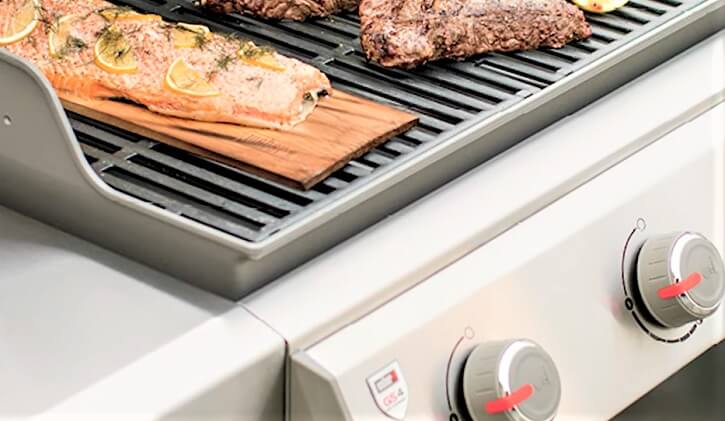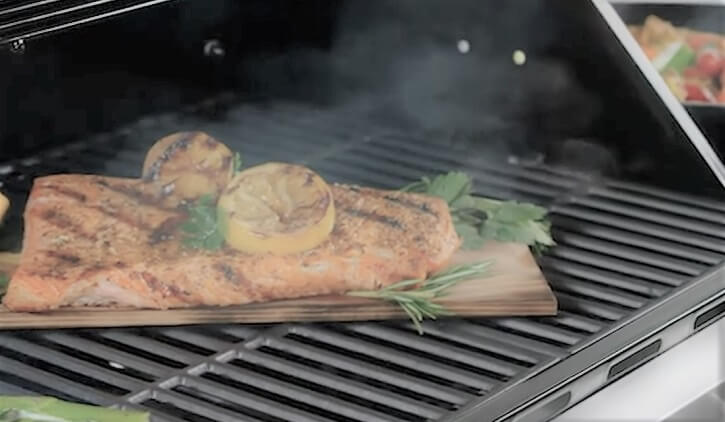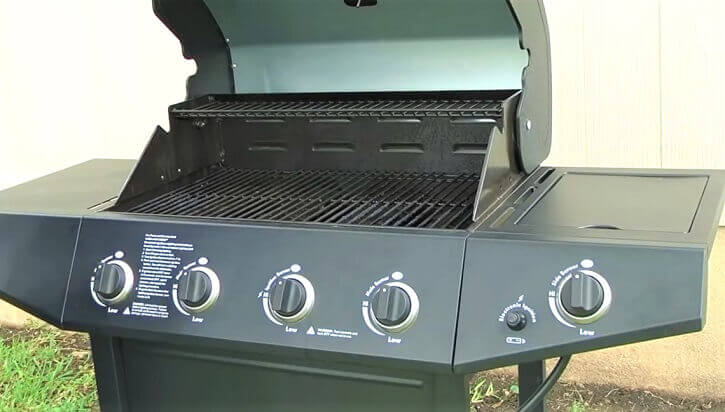Note: This article may contain affiliate links, which means if you make a purchase following our links won’t cost you extra, but we may earn a commission. Learn more
If you’re a grill master, you know that there’s nothing worse than firing up your grill only to find that it’s not working properly. While gas grills are relatively low-maintenance, they can still experience common problems.
Think, your gas grill burner is dirty or clogged burner. Over time, grease and food particles can build up on your burner and block the gas from flowing through properly. This can lead to uneven cooking or even cause your grill to flare up. That is, one such problem creates another issue.
In this blog post, we’ll discuss some of the most common gas grill problems and how to fix them.
Common Gas Grill Problems
If you’re like most people, you love to grill out during the summer. There’s nothing quite like firing up the grill and cooking up a delicious meal for your friends and family. However, grilling can sometimes be a pain, especially when things go wrong.
Here are some common gas grill problems, the causes of the problems, and how to fix them.

1. Gas Grill Just Won’t Light
When your gas grill won’t light, it’s usually because there’s a problem with the gas supply, the igniter, or the burner. Here are some common reasons why your gas grill won’t light, and how to fix them:
If you’re having trouble getting your gas grill to light, there are a few potential causes. In most cases, the problem can be fixed with some basic troubleshooting.
One common reason why gas grills won’t light is that the gas tank is empty. If this is the case, simply refill the tank and try again.
Another possibility is that the gas valve is not turned on. Make sure that the valve is in the “on” position before trying to ignite the grill.
If the grill still won’t light, the problem may be with the igniter. The igniter is what creates the spark that lights the gas. If it’s dirty or damaged, it may not work properly. Cleaning or replacing the igniter should fix the problem.
In some cases, the problem may be with the gas line. If there is a leak in the line, gas will not flow properly to the grill. This can be dangerous, so it’s best to call a professional to fix the problem.
Gas grills are a great way to cook food, but they can be frustrating when they won’t light. If you’re having trouble, try troubleshooting the problem to see if you can fix it yourself. In most cases, a simple fix will get your grill working again.
Learn More: Why Is My Gas Stove Not Clicking? Quick Fixes
2. Yellow or Orange Flame
If you’ve ever wondered why your gas grill’s flame is yellow or orange, you’re not alone. While a blue flame is ideal, a yellow or orange flame can indicate a problem with your grill.
One possible reason for a yellow or orange flame is that your grill is not getting enough air. This can happen if the grill is dirty or the vents are blocked. To fix this, simply clean the grill and make sure the vents are clear.
Another possible reason for a yellow or orange flame is that the gas pressure is too low. This can happen if the regulator is set too low or if there is a leak in the gas line. To fix this, increase the gas pressure or repair the leak.
A yellow or orange flame can also be caused by a problem with the burner. This can happen if the burner is dirty or the holes are blocked. To fix this, clean the burner and make sure the holes are clear.
If you’re still having trouble with a yellow or orange flame, it’s best to consult a professional. They can help you troubleshoot the problem and get your grill back to working properly.
3. Uneven Heating
If you find that your gas grill is not heating evenly, there are a few possible causes.
1. The grill is not level. A grill that is not level will cause the heat to be distributed unevenly, with the side that is higher receiving more heat than the side that is lower.
2. The burner tubes are dirty. When the burner tubes are dirty, the gas cannot flow evenly, and this will also cause the heat to be distributed unevenly.
3. The grill grates are not clean. If the grill grates are dirty, they will not conduct heat evenly, and this will also cause the heat to be distributed unevenly.
If you find that your gas grill is not heating evenly, one thing that you can do is clean the burner tubes. You can do this by removing the tubes from the grill and soaking them in a solution of soapy water.
Another thing that you can do is clean the grill grates. You can do this by removing the grates from the grill and scrubbing them with a stiff brush.
Also, you can level the grill by adjusting the legs.
4. Grill Produces a Lot of Smoke
A gas grill produces a lot of smoke because the gas doesn’t burn cleanly. The gas mixes with the air and creates a lot of soot. The soot is what you see when you look at the smoke coming from a gas grill.
There are a few things that can cause a gas grill to produce a lot of smoke. One is if the grill isn’t hot enough. The gas needs to be hot enough to vaporize, and if it’s not, it will produce a lot of smoke. Another thing that can cause a gas grill to produce a lot of smoke is if there’s a lot of fat on the food you’re cooking. The fat will drip down onto the coals and create a lot of smoke.
If your grill is producing a lot of smoke, there are a few things you can do to fix it. One is to make sure the grill is hot enough. If it’s not, turn up the heat. Another thing you can do is clean the grill before you use it. A dirty grill will cause the gas to not burn as cleanly and will create more smoke.
If there’s a lot of fat on the food you’re cooking, try to trim it off before you cook it. This will help to reduce the amount of smoke the grill produces.

5. The Flame is Too Low or Too High
If your gas grill flame is too low or too high, check to make sure that your grill is properly ventilated. If there is not enough airflow, the flame will be suffocated and will not be able to reach its full potential.
Then, check the gas line to ensure that there is no blockage. If the gas line is clogged, the flow of gas to the grill will be restricted, resulting in a low flame.
Also, check the regulator to make sure that it is set to the correct pressure. If the regulator is set too low, the flame will be too low. If the regulator is set too high, the flame will be too high.
If you are still having trouble, you can try adjusting the size of the orifice. A smaller orifice will result in a lower flame, while a larger orifice will result in a higher flame. If you are still having trouble, you can contact a gas grill technician for assistance.
6. The Food Isn’t Cooking Evenly
If your gas grill food isn’t cooking evenly, it’s likely due to one of several common causes. First, check to make sure that all of the burners are lit and that the gas is turned on. If the problem persists, it’s likely due to an issue with the grill grate itself. The grate may be dirty or warped, which can prevent heat from being evenly distributed. In some cases, simply cleaning or replacing the grate can solve the problem.
Another common cause of uneven cooking is a build-up of grease and debris on the grill grates. This can create hot spots that cause food to cook unevenly. To prevent this, be sure to clean your grill grates regularly. You can use a wire brush or a putty knife to scrape away any build-up.
If your grill has a side burner, you may also find that food is cooking unevenly if the side burner is not being used. The side burner can help to even out the heat on the grill, so be sure to use it when grilling.
Also, make sure that you are using the correct type of fuel for your grill. If you are using charcoal, be sure to use a high-quality brand that is designed for grilling. If you are using propane, be sure that the tank is full and that the grill is properly ventilated.
By following these tips, you can ensure that your gas grill food will cook evenly every time.
7. Low Temperature
If your gas grill isn’t putting out enough heat, the most common is that the regulator needs to be adjusted. The regulator is what controls the flow of gas to the burner. If it’s not set properly, the grill won’t get enough gas to create a strong flame.
Another potential cause is a clogged burner. If the burner holes are blocked, the gas can’t flow properly and the flame will be weak. You can clean the burner with a wire brush or pipe cleaner.
If your grill has electronic ignition, it could be the batteries need to be replaced. The igniter needs a strong spark to ignite the gas, so if the batteries are weak, the grill won’t light.
Check the propane tank. If it’s low on gas, the pressure won’t be enough to force the gas through the regulator and to the burner. Always keep the tank at least half full so you don’t run into this problem.
If you’ve checked all of these things and your grill still won’t light, it’s time to call a professional. There could be a problem with the gas line or the grill itself that a pro will need to take a look at.
What is the Average Life of a Gas Grill?
If you’re thinking about buying a gas grill, one of the first questions you’ll probably ask is how long it will last. Unfortunately, there’s no easy answer to this question since there are so many variables that can affect a gas grill’s lifespan. However, in general, most gas grills will last between 5 and 15 years with proper care and maintenance.
Of course, the biggest factor in determining how long your gas grill will last is how well you take care of it. If you regularly clean and maintain your grill, it will definitely last longer than if you let it fall into disrepair. Additionally, higher-quality grills tend to have longer lifespans than lower-quality models.
So, if you want your grill to last for as long as possible, be sure to buy a model from a reputable brand. Another factor that can affect a gas grill’s lifespan is how often you use it. Obviously, grills that are used more frequently will wear out faster than those that are only used occasionally.
If you plan on using your grill several times per week during the summer months, expect it to need replacing sooner than if you only break it out for special occasions. Finally, the type of fuel you use in your grill can also play a role in its longevity. Grills that run on propane tend to have shorter lifespans than those that use natural gas because propane is more corrosive than natural gas.
What the Common Problems Occur When Grilling?
One of the most common problems that occur when grilling is flare-ups. Flare-ups happen when fat or juices from the food drip down onto the hot coals, causing them to flare up. To avoid flare-ups, make sure to trim any excess fat off of your meat and keep your grill clean.
Another common problem is overcooking food. This can be easily avoided by using a meat thermometer to check the internal temperature of your food. Make sure to remove your food from the grill when it reaches the desired temperature.
Also, a common problem is an undercooking food. This can also be avoided by using a meat thermometer and cooking your food for the recommended amount of time-based on its thickness. If you are unsure, it is always better to err on the side of caution and cook it for a little longer rather than not long enough.
Why Did My Gas Grill Stop Working?
If you’re like most people, your gas grill is an essential part of your outdoor cooking repertoire. So, when it suddenly stops working, it can be a major disappointment. While there are a number of reasons why your gas grill may have stopped working, here are some of the most common culprits:
1. The Gas Tank Is Empty. This may seem like an obvious one, but it’s worth checking first. If your gas tank is empty (or close to empty), then your grill will obviously not work. Be sure to check the level of the propane in your tank before troubleshooting any other potential issues.
2. The Regulator Is Clogged or Damaged. The regulator is responsible for regulating the flow of gas from the tank to the burners. If this component is damaged or clogged, then gas will not be able to flow properly and your grill will not work. Inspect the regulator for any damage and clean out any debris that may be blocking it. You may need to replace the regulator if it is damaged beyond repair.
3. The Burners Are Clogged or Damaged. If gas is able to flow from the tank but isn’t igniting properly, then chances are there’s an issue with the burners. Over time, grease and food residue can build up on burner grates and in burner tubes, causing blockages that prevent proper ignition.
Cleaning or replacing dirty or damaged burners should fix this problem.
How Do I Know If My Gas Grill Regulator Is Bad?
If your grill regulator is bad, you may experience problems with your gas grill. The most common problem is that the grill will not light. Other symptoms can include the grill not reaching the correct temperature, or flames that are too low or too high.
If you experience any of these problems, it’s important to check your grill regulator to see if it needs to be replaced. Here are some tips on how to tell if your gas grill regulator is bad:
1. If your grill won’t light, the first thing you should check is the regulator. A bad regulator can prevent gas from flowing to the burner, which will prevent the grill from igniting.
2. If your flames are too low or too high, this can also be a sign of a bad regulator. If the pressure isn’t regulated properly, it can cause uneven cooking temperatures and uneven flames.
3. Another symptom of a bad regulator is if the gauge isn’t working properly. The gauge is what tells you how much propane is in the tank, so if it’s not working correctly, it could lead to running out of propane while cooking.
If you think your gas grill regulator might be bad, it’s important to replace it as soon as possible. A faulty regulator can be dangerous and cause serious problems with your grill.
Gas Grill Regulator Problems
If you’re having problems with your gas grill regulator, make sure that the regulator is turned on. Then, check the gauge to see if it’s reading properly. If the gauge isn’t reading correctly, it may need to be replaced.
Also. check the hoses leading to and from the regulator for any leaks or blockages. If you can’t find the source of the problem, it’s best to call a professional for help.
Gas Grill Gets Too Hot on Low Setting
If you find that your gas grill gets too hot on the low setting, there are a few things that you can do to try and remedy the situation.
1. Check to see if there is an adjustment knob for the burner control. If so, turn it to a lower setting.
2. Check the regulator valve to make sure it is set properly.
3. Clean out any debris that may have accumulated in the burner area.

Summary
It’s always frustrating when you run into problems with your gas grill, but fortunately, there are some easy ways to fix common issues. If your grill won’t light, make sure to check the gas tank and connections first. If the grill is lit but the flame is low, you may need to adjust the gas flow. And if your food is sticking to the grill, be sure to clean the grates before cooking. With a little troubleshooting, you can get your grill back up and running in no time.